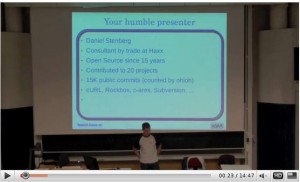For many years I’ve always kept up to speed with my commitments in my primary open source projects. I’ve managed to set aside enough time to close the bug reports as fast as they have poured in. This, while still having time to work on new features every now and then.
During this last year (or so) however, I’ve come to realize that I no longer can claim to be in that fortunate position and I now find myself seeing the pile of open bugs get bigger and bigger over time. I get more bug reports than I manage to close.
There are of course explanations for this. In both ends of the mix actually. I’ve got slightly less time due my recent decision to go working for Haxx full-time, and how I’ve decided to focus slightly more on paid work which thus leads to me having less time for the unpaid work I’m doing.
Also, I’ve seen activity raise in the curl project, in the libssh2 project and in the c-ares project. All of these projects have the same problem of various degrees: a lack of participating developers working on fixing bugs. Especially bugs reported by someone else.
Since this situation is still fairly new to me, I need to learn on how to adapt to it. How to deal with a stream of issues that is overwhelming and I must select what particular things I care about and what to “let through”. This of course isn’t ideal for the projects but I can’t do much more than proceed to the best of my ability, to try to make people aware of that this is happening and try to get more people involved to help out!
Don’t get fooled by my focus on “time” above. Sometimes I even plainly lack the energy necessary to pull through. It depends a lot on the tone or impression I get from the report or reporter how I feel, but when a reporter is rude or just too “demanding” (like constantly violating the mailing list etiquette or just leaving out details even when asked) I can’t but help to feel that at times working as a developer during my full-day paid hours can make it a bit hard to then work a couple of hours more in the late evening debugging further.
The upside, let’s try to see it as a positive thing, is that now I can actually “punish” those that clearly don’t deserve to get helped since I now focus on the nice people, the good reports, the ones which seem to be written by clever people with an actual interest to see their problems addressed. Those who don’t do their part I’ll just happily ignore until they shape up.
I will deliberately just let issues “slip through” and not get my attention and require that if they are important enough people will either report it again, someone else will step up and help fix them or perhaps someone will even consider paying for the fix.


